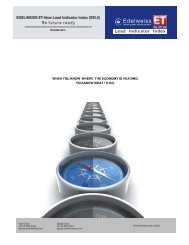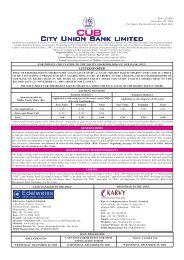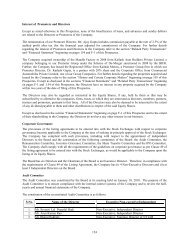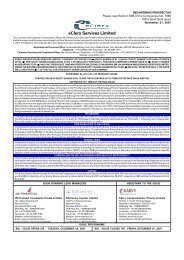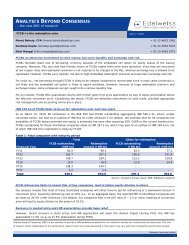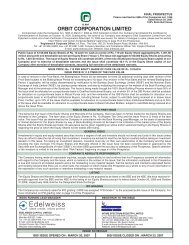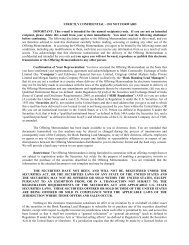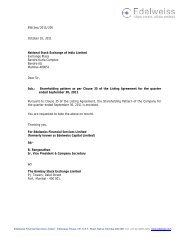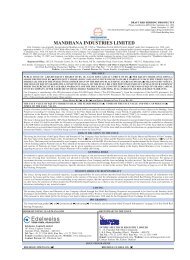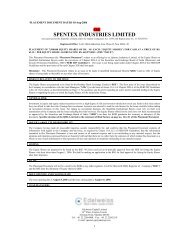Annexure XIV Continued⦠- Edelweiss
Annexure XIV Continued⦠- Edelweiss
Annexure XIV Continued⦠- Edelweiss
You also want an ePaper? Increase the reach of your titles
YUMPU automatically turns print PDFs into web optimized ePapers that Google loves.
(a)<br />
(b)<br />
(c)<br />
(d)<br />
(e)<br />
the power to make calls on shareholders in respect of money unpaid on their shares;<br />
the power to issue debentures;<br />
the power to borrow moneys otherwise than on debentures;<br />
the power to invest the funds of the Company;<br />
the power to make loans;<br />
Provided that the Board may by resolution passed at a meeting delegate to any Committee of<br />
Directors or the Managing Director or any other principal officers of the Company or to a principal<br />
officer of any of its branch offices, the powers specified in (c), (d) and (e) of this Article to the extent<br />
specified below on such conditions as the Board may prescribe.”<br />
Article 61.2 provides that “Every resolution delegating the power referred to in clause (c) of Article 61.1 shall<br />
specify the total amount outstanding at any one time up to which moneys may be borrowed by the delegates;<br />
Provided, however, that where the Company has an arrangement with its bankers for the borrowing of moneys<br />
by way of overdraft, cash credit or otherwise the actual day to day operation of the overdraft, cash credit or<br />
other accounts by means of which the arrangement is made is availed of shall not require the sanction of the<br />
Board.”<br />
Article 61.3 provides that “Every resolution delegating the power referred to in clause (e) of Article 61.1 shall<br />
specify the total amount up to which loans may be made by the delegates, the purposes for which the loans<br />
may be made, and the maximum amount of loans which may be made for each such purpose in individual<br />
cases.”<br />
Article 61.4 provides that “Nothing contained in this Article shall be deemed to affect the right of the<br />
Company in a General Meeting to impose restrictions and conditions on the exercise by the Board of any of<br />
the powers referred to in Article 61.1 above.”<br />
Part II<br />
Overriding Effect and Interpretation<br />
Article 71.1 provides that “Subject to the requirements of applicable law, in the event of any conflict between<br />
the provisions of Part I and this Part II, the provisions of this Part II shall apply so long as Part II is effective.”<br />
Restrictions on Transfer of Shares in the Company<br />
Article 73 provides that “Any agreement or arrangement to directly or indirectly Transfer any Equity Shares,<br />
or any legal or beneficial interest therein, which is in breach of Articles 73 to 77 shall be null and void. The<br />
Company shall not record any Transfer or agreement or arrangement to Transfer, that is in breach of the<br />
provisions of Articles 73 to 77 on its books, and shall not recognise or register any equitable or other claim to,<br />
or any interest in, Equity Shares which have been Transferred in breach of the provisions of Articles 73 to 77.”<br />
Transfers by Identified Parties<br />
Article 74 provides that:<br />
“(a) Notwithstanding anything to the contrary, for a period of four (4) years from the Completion Date or until<br />
an IPO occurs, whichever is later (the "Identified Party Lock-in Period"), no Identified Party or any of<br />
their Affiliates, holding shares in the Company, shall directly or indirectly, Transfer any of the Equity<br />
Shares or other securities held by them in the Company or rights attached thereto.<br />
Provided that, even during the Identified Party Lock-in Period, the Identified Parties may sell to any<br />
Person (other than a Restricted Entity), in a single tranche, up to 129,388 Equity Shares (the “Permitted<br />
Sale”) by giving at least seven (7) days prior written notice to the Investor. The Investor shall not be<br />
entitled to exercise its Tag-along Rights in relation to the Permitted Sale.<br />
(b) If the IPO has occurred within four (4) years from the Completion Date, the Identified Party Lock-in<br />
Period would still be in effect until the expiry of four (4) years from the Completion Date. Provided that,<br />
notwithstanding Article 74 (a), should the IPO have occurred within 4 years from the Completion Date,<br />
448




